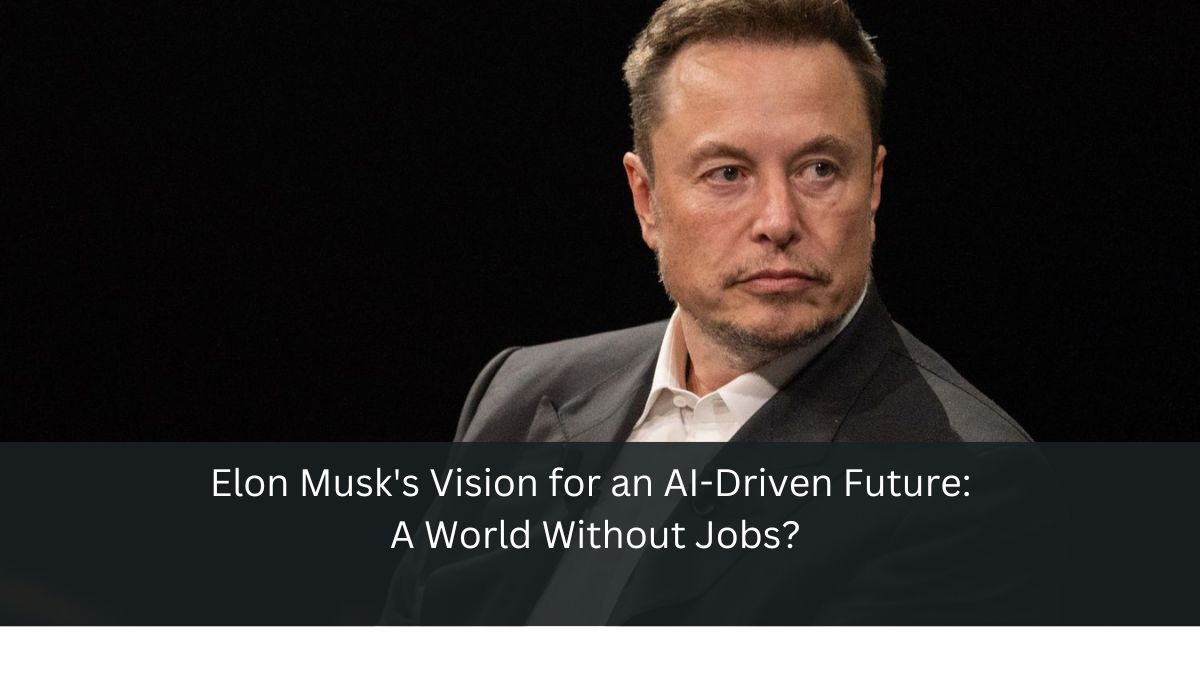AI
Elon Musk’s Vision for an AI-Driven Future: A World Without Jobs?

As artificial intelligence (AI) continues to advance at an unprecedented pace, questions about its impact on the future of work have become increasingly pressing. Elon Musk, the visionary entrepreneur behind companies like Tesla and SpaceX, recently shared his thoughts on this topic at the VivaTech 2024 conference in Paris. In a keynote speech delivered via webcam, Musk painted a picture of a future where AI and robots would render human jobs optional, prompting a fundamental shift in the way we think about work and meaning in our lives.
The Inevitability of AI Displacement
Musk’s prediction was stark: “Probably none of us will have a job.” He envisions a world where AI and robots will be capable of providing all the goods and services that humans need, effectively making traditional employment obsolete. This scenario, while perhaps alarming to some, is not entirely surprising given the rapid advancements we’ve seen in AI capabilities over the past few years.
From chatbots that can engage in human-like conversations to algorithms that can analyze vast amounts of data and make complex decisions, AI is already transforming industries and automating tasks that were once the exclusive domain of human workers. As these technologies continue to evolve and become more sophisticated, it’s not hard to imagine a future where they can replace even more jobs across a wide range of sectors.
The Need for Universal High Income
Of course, the idea of a jobless future raises significant questions about how people will support themselves and maintain a decent standard of living. Musk acknowledges this challenge and suggests that a system of “universal high income” would be necessary to ensure that everyone can access the goods and services they need, even in the absence of traditional employment.
It’s worth noting that this concept is distinct from the idea of universal basic income (UBI), which has gained traction in recent years as a potential solution to the problem of technological unemployment. UBI typically involves providing a fixed amount of money to all citizens, regardless of their employment status or income level. In contrast, Musk’s vision of universal high income seems to imply a more generous and comprehensive system of support, although he did not provide specific details on how it would work in practice.
The Question of Meaning
While the prospect of a world without jobs may sound appealing to some, it also raises profound questions about the role of work in our lives and the sources of meaning and fulfillment that we derive from it. Musk himself acknowledges this dilemma, asking: “If the computer and robots can do everything better than you, does your life have meaning?”
For many people, work is not just a means of earning a living, but also a source of identity, purpose, and social connection. The idea of a future where these things are no longer tied to traditional employment is both exciting and unsettling, as it challenges us to rethink our assumptions about what makes life meaningful and worthwhile.
Musk suggests that humans may still have a role to play in this new world, perhaps by giving AI meaning and purpose. This idea is intriguing, as it suggests that our relationship with AI could evolve from one of competition and displacement to one of collaboration and co-creation. By working alongside AI and robots, we may be able to unlock new forms of creativity, innovation, and self-expression that were previously unimaginable.
The Risks and Challenges Ahead
Of course, the path to an AI-driven future is not without its risks and challenges. As Musk himself acknowledges, AI is also his biggest fear, and there are legitimate concerns about the potential for these technologies to be misused or to have unintended consequences.
One such concern is the impact of AI on children and young people, who are growing up in a world where they are constantly bombarded with algorithmically curated content designed to maximize engagement and dopamine hits. Musk urges parents to limit their children’s exposure to social media, warning that they are being “programmed by a dopamine-maximizing AI.”
There are also questions about the distribution of benefits and costs in an AI-driven economy. Will the gains from increased productivity and efficiency be shared equitably, or will they accrue primarily to the owners of capital and the developers of these technologies? How can we ensure that the transition to a jobless future is managed in a way that minimizes social and economic disruption?
The Vision Of A Future
Elon Musk’s vision of a future where AI and robots render human jobs optional is both thrilling and daunting. It promises a world of abundance and leisure, where everyone has access to the goods and services they need, but it also challenges us to rethink our assumptions about work, meaning, and purpose in life.
As we navigate this uncharted territory, it will be essential to engage in open and honest conversations about the risks and opportunities ahead. We must work to ensure that the benefits of AI are distributed equitably and that the transition to a new economic paradigm is managed in a way that minimizes social and economic disruption.
Ultimately, the future is not predetermined, and it will be up to us to shape it in a way that reflects our values and aspirations. By embracing the possibilities of AI while also remaining vigilant about its potential pitfalls, we can work towards a future that is both prosperous and meaningful for all.
